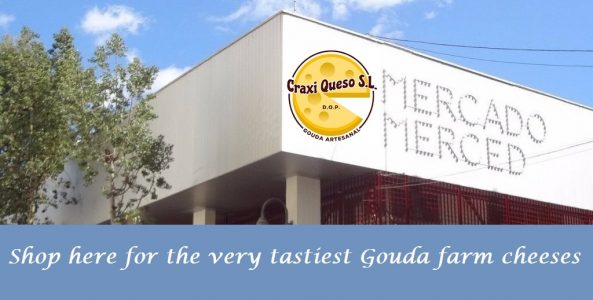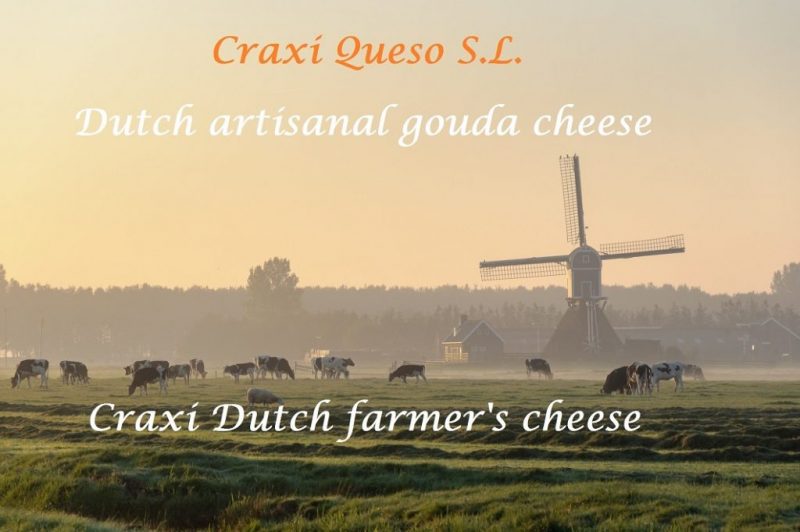Raw milk cheese from cow’s milk.

Artisan raw milk Dutch Gouda cheese.
The revival of raw-milk cheese.
The growing interest in raw milk cheeses is understandable because more and more people want to know where their food comes from, how it is made, and what it really contains. But the mean reason why people switch from eating factory cheese to farm cheese is the taste sensation of real cheese!
Raw milk cheeses for those who enjoy the authentic taste of cheese.
What is raw milk cheese? It is a cheese made with unheated milk, so it is never made with thermised or pasteurised milk.
Thermisation is the heating of milk prior to cheese production to improve its shelf life without unduly altering the flavour. Factory cheese is pasteurised, craxi farm cheese is made from raw milk (completely unheated) and thermisation is somewhere in between. With thermisation, the milk rises above 40°C, but the temperature is kept below 72°C.
Artisan gouda cheese is a cheese made on the farm itself from the raw milk of its own herd. Since 2007, artisanal gouda must meet these requirements in order to be called artisanal gouda. This means that artisan gouda is never made with thermised or pasteurised milk.
Raw milk Gouda cheese from cow’s milk.
Gouda cheese, with its characteristic yellow colour, is known all over the world, but its origin is in the Netherlands. In many countries, Gouda cheese is made from pasteurised milk, but in the Netherlands, there are still some cheese farms where Gouda cheese is made using traditional methods.
The taste contrast between industrial cheeses made from pasteurised milk and artisanal cheeses made from raw milk is therefore quite significant. Cheese made from raw milk has a fuller flavour and a more intense taste perception. Raw milk is not heated and is also called unpasteurised milk. Fresh milk is processed into cheese immediately after milking on the farm.
Artisan raw milk cheese or pasteurised factory cheese.
Pasteurised milk is basically “dead milk”. To make cheese from it, cheesemakers must add back bacteria grown in the laboratory and available in powder form. As the cultures used are often the same, it is more difficult to give pasteurised cheeses a unique character.
Also to get more taste in factory cheese, a factory cheese spends a longer time in the brine bath, so it can absorb more salt. “With raw milk, you have a different starting point. It already contains a composition of good bacteria, minerals and proteins, which gives you a cheese that is a quality product with a much more intense delicious taste than pasteurised cheese, and farm cheese spends less time in the brine bath, which results in lower salt content.
The heat treatments applied to milk (thermisation and pasteurisation) eliminate most of the micro-organisms present in milk, both the “good” and the “bad” ones.
While the heat kills all possible harmful bacteria, it also eliminates the bacteria naturally present in the milk that contribute to the flavour, complexity and character of the cheese made from it. There is also growing evidence that the bacteria in raw milk have many health benefits, including improved digestion. In addition, the lactic acid-producing bacteria normally present in raw milk produce a number of protective mechanisms to counteract any harmful elements.
Dutch artisan gouda farm cheese.
Farm cheeses tend to have a less consistent taste, seasonal influences can be recognised, for example. Fans of farm cheeses often see this as an advantage, because there is always something new to discover in the taste.
If you have any questions, please contact us via the contact form on the website.

Our gouda farm cheeses are available in our Craxi artisan Dutch Gouda cheese shop in Malaga, address Mercado Merced, Calle Merced, 4, 29012 Malaga, Spain.